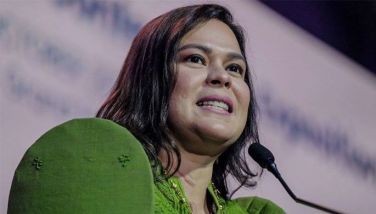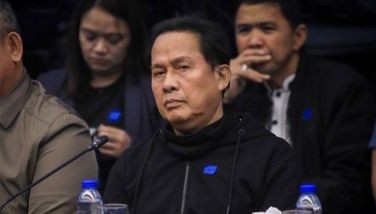Winds of change seen in ASEAN under new leadership
June 14, 2003 | 12:00am
Faced with terrorism threats, embarrassed by Myanmar, and locked in bilateral disputes, members of the Association of Southeast Asian Nations (ASEAN) are expected to give priority to political and security issues after Indonesia takes over the group’s leadership this month.
The ASEAN, which operates by consensus and adheres to non-interference in political and security affairs of its 10 members, had been preoccupied by economic issues in recent years, especially moves to set up a free trade area.
Political issues in member nations even with regional implications were mostly relegated to the sidelines. There was little if any collective response to global political developments, like the Iraq War.
Also, regional security was not given due attention despite the threat posed by militant Islamic groups linked to Osama bin Laden’s al-Qaeda terror network allegedly behind the Bali carnage last year.
But ASEAN’s outlook could change when Indonesia takes over the chairmanship of the grouping’s standing committee, the policy-making mechanism, at the grouping’s annual meeting in Phnom Penh next week.
Indonesia, Southeast Asia’s largest and most populous country as well the region’s biggest democracy, is to propose a forum to tackle raging political and security issues, ASEAN officials say.
Jakarta wants to set up a so-called "ASEAN Security Community," a framework agreement that contains "principles and mechanisms to promote regional security and political dialogue and cooperation," an official told AFP.
No operational details of Indonesia’s proposal are available but officials expect it to be keenly debated among ASEAN members Brunei, Cambodia, Indonesia, Laos, Malaysia, Myanmar, the Philippines, Singapore, Thailand and Vietnam.
"It is not just a defense pact or security cooperation pact but an agreement that covers all aspects of politics and security," Indonesian Foreign Minister Hassan Wirayuda was quoted saying recently.
"The failure of conflict resolution among us (ASEAN), provides loopholes for other countries to interfere. It is important therefore to build ASEAN’s political power," Wirayuda said.
"In the past five years we have been concentrating more on economic cooperation, while to have a strong ASEAN we need to balance that with political cooperation," he added.
The Iraq War was cited as an example of political disarray in ASEAN as the Philippines and Singapore supported the US-led attack while Indonesia and Malaysia opposed it.
The question of Myanmar, where opposition leader Aung San Suu Kyi has been detained after clashes in the latest twist to efforts to restore democratic reforms, has also dogged ASEAN for years.
While Western nations imposed political and economic sanctions on Myanmar for its reluctance to restore democracy, ASEAN preferred to adopt a policy of "constructive engagement," which has failed to change the political landscape of Myanmar.
In the security arena, ASEAN has forged agreements to combat terrorism but analysts say it still lacks a cohesive strategy to face the threat posed by the Jemaah Islamiyah, the Southeast Asian chapter of al-Qaeda blamed for the Bali bomb attacks.
ASEAN watchers warn that the grouping has to confront political and security challenges in its backyard if it wants to earn the respect of its key Western dialogue and trading partners, the United States and Europe, as well as Asian giants China and Japan.
Indonesia’s proposal "is a very serious policy direction for ASEAN to take," ASEAN spokesman M.C. Abad told Agence France Presse.
"The consideration of a security community for Southeast Asia is a qualitative leap in the evolution of ASEAN’s security and political dialogue and cooperation," he said.
But Abad pointed out that the move would "enhance ASEAN’s political identity, which could have implications on intra-ASEAN conflict management on one hand and on ASEAN’s political role beyond its borders on the other."
"If you are part of a community and if a problem emerges in any country in the region, that problem is no more my or your problem, it is our problem," noted a Southeast Asian diplomat.
"Similarly, the Myanmar issue will become an ASEAN issue in need of an ASEAN solution," the diplomat said, speaking on condition of anonymity.
Indonesia’s proposal comes at a time when there is apparently a vacuum in the leadership of the 36-year-old ASEAN grouping.
With regional strongman Malaysian Prime Minister Mahathir Mohamad set to step down in October after more than two decades at the helm, Jakarta is trying to reassert its influence as the de facto leader of the region, some analysts say.
But Dewi Fortuna Anwar, a Jakarta-based political commentator, said Indonesia had always regarded itself as a "first among equals" in ASEAN.
"What is important is Southeast Asian nations are masters of their own destiny and their decisions are not dictated by external powers," she said. – AFP
The ASEAN, which operates by consensus and adheres to non-interference in political and security affairs of its 10 members, had been preoccupied by economic issues in recent years, especially moves to set up a free trade area.
Political issues in member nations even with regional implications were mostly relegated to the sidelines. There was little if any collective response to global political developments, like the Iraq War.
Also, regional security was not given due attention despite the threat posed by militant Islamic groups linked to Osama bin Laden’s al-Qaeda terror network allegedly behind the Bali carnage last year.
But ASEAN’s outlook could change when Indonesia takes over the chairmanship of the grouping’s standing committee, the policy-making mechanism, at the grouping’s annual meeting in Phnom Penh next week.
Indonesia, Southeast Asia’s largest and most populous country as well the region’s biggest democracy, is to propose a forum to tackle raging political and security issues, ASEAN officials say.
Jakarta wants to set up a so-called "ASEAN Security Community," a framework agreement that contains "principles and mechanisms to promote regional security and political dialogue and cooperation," an official told AFP.
No operational details of Indonesia’s proposal are available but officials expect it to be keenly debated among ASEAN members Brunei, Cambodia, Indonesia, Laos, Malaysia, Myanmar, the Philippines, Singapore, Thailand and Vietnam.
"It is not just a defense pact or security cooperation pact but an agreement that covers all aspects of politics and security," Indonesian Foreign Minister Hassan Wirayuda was quoted saying recently.
"The failure of conflict resolution among us (ASEAN), provides loopholes for other countries to interfere. It is important therefore to build ASEAN’s political power," Wirayuda said.
"In the past five years we have been concentrating more on economic cooperation, while to have a strong ASEAN we need to balance that with political cooperation," he added.
The Iraq War was cited as an example of political disarray in ASEAN as the Philippines and Singapore supported the US-led attack while Indonesia and Malaysia opposed it.
The question of Myanmar, where opposition leader Aung San Suu Kyi has been detained after clashes in the latest twist to efforts to restore democratic reforms, has also dogged ASEAN for years.
While Western nations imposed political and economic sanctions on Myanmar for its reluctance to restore democracy, ASEAN preferred to adopt a policy of "constructive engagement," which has failed to change the political landscape of Myanmar.
In the security arena, ASEAN has forged agreements to combat terrorism but analysts say it still lacks a cohesive strategy to face the threat posed by the Jemaah Islamiyah, the Southeast Asian chapter of al-Qaeda blamed for the Bali bomb attacks.
ASEAN watchers warn that the grouping has to confront political and security challenges in its backyard if it wants to earn the respect of its key Western dialogue and trading partners, the United States and Europe, as well as Asian giants China and Japan.
Indonesia’s proposal "is a very serious policy direction for ASEAN to take," ASEAN spokesman M.C. Abad told Agence France Presse.
"The consideration of a security community for Southeast Asia is a qualitative leap in the evolution of ASEAN’s security and political dialogue and cooperation," he said.
But Abad pointed out that the move would "enhance ASEAN’s political identity, which could have implications on intra-ASEAN conflict management on one hand and on ASEAN’s political role beyond its borders on the other."
"If you are part of a community and if a problem emerges in any country in the region, that problem is no more my or your problem, it is our problem," noted a Southeast Asian diplomat.
"Similarly, the Myanmar issue will become an ASEAN issue in need of an ASEAN solution," the diplomat said, speaking on condition of anonymity.
Indonesia’s proposal comes at a time when there is apparently a vacuum in the leadership of the 36-year-old ASEAN grouping.
With regional strongman Malaysian Prime Minister Mahathir Mohamad set to step down in October after more than two decades at the helm, Jakarta is trying to reassert its influence as the de facto leader of the region, some analysts say.
But Dewi Fortuna Anwar, a Jakarta-based political commentator, said Indonesia had always regarded itself as a "first among equals" in ASEAN.
"What is important is Southeast Asian nations are masters of their own destiny and their decisions are not dictated by external powers," she said. – AFP
BrandSpace Articles
<
>
- Latest
- Trending
Trending
Latest
Trending
Latest
Recommended

































